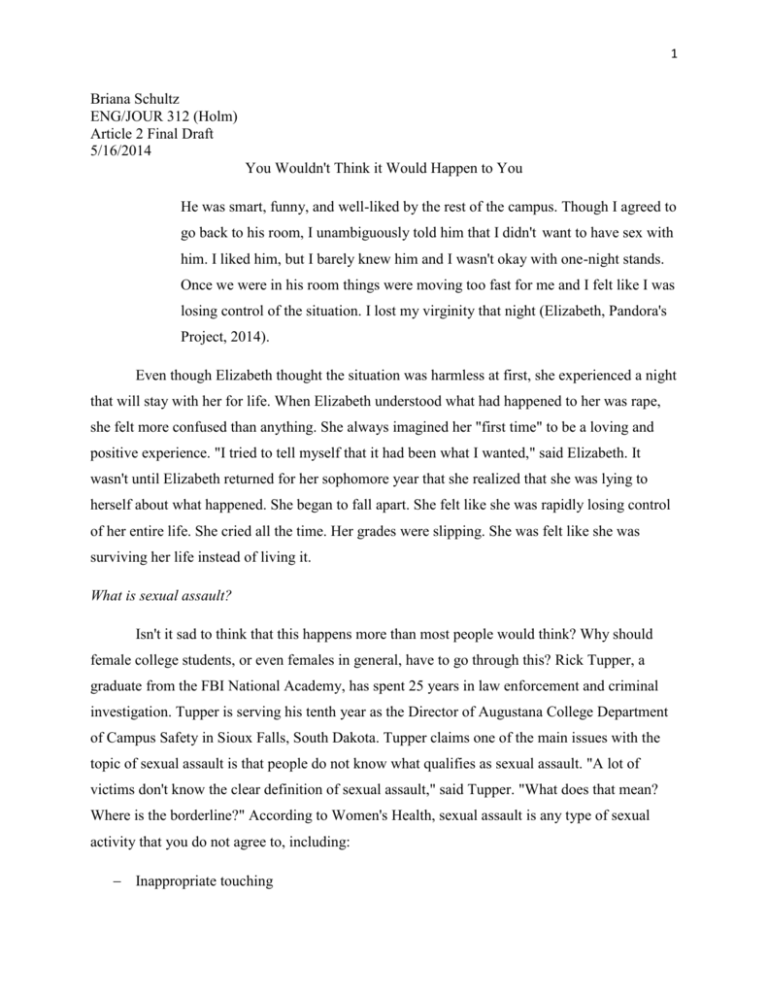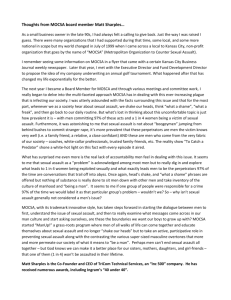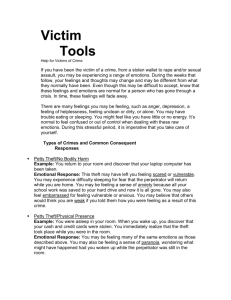
1
Briana Schultz
ENG/JOUR 312 (Holm)
Article 2 Final Draft
5/16/2014
You Wouldn't Think it Would Happen to You
He was smart, funny, and well-liked by the rest of the campus. Though I agreed to
go back to his room, I unambiguously told him that I didn't want to have sex with
him. I liked him, but I barely knew him and I wasn't okay with one-night stands.
Once we were in his room things were moving too fast for me and I felt like I was
losing control of the situation. I lost my virginity that night (Elizabeth, Pandora's
Project, 2014).
Even though Elizabeth thought the situation was harmless at first, she experienced a night
that will stay with her for life. When Elizabeth understood what had happened to her was rape,
she felt more confused than anything. She always imagined her "first time" to be a loving and
positive experience. "I tried to tell myself that it had been what I wanted," said Elizabeth. It
wasn't until Elizabeth returned for her sophomore year that she realized that she was lying to
herself about what happened. She began to fall apart. She felt like she was rapidly losing control
of her entire life. She cried all the time. Her grades were slipping. She was felt like she was
surviving her life instead of living it.
What is sexual assault?
Isn't it sad to think that this happens more than most people would think? Why should
female college students, or even females in general, have to go through this? Rick Tupper, a
graduate from the FBI National Academy, has spent 25 years in law enforcement and criminal
investigation. Tupper is serving his tenth year as the Director of Augustana College Department
of Campus Safety in Sioux Falls, South Dakota. Tupper claims one of the main issues with the
topic of sexual assault is that people do not know what qualifies as sexual assault. "A lot of
victims don't know the clear definition of sexual assault," said Tupper. "What does that mean?
Where is the borderline?" According to Women's Health, sexual assault is any type of sexual
activity that you do not agree to, including:
Inappropriate touching
2
Vaginal, anal, or oral penetration
Sexual intercourse that you say no to
Rape
Attempted rape
Child molestation
Even if the person experiencing this misconduct realizes what happened to them was rape
or assault, sexual assault is a crime that goes dramatically under-reported, especially on college
campuses, where just 12 percent of victims ever report their incident to the authorities. Common
reasons for not going to authorities are the fear that students will be punished under the school's
drug and alcohol policy, discomfort with reporting someone who is a classmate or an
acquaintance, or feelings of embarrassment, shame, or anger.
"One in five females will experience sexual assault on college campuses throughout
college and only one out of eight will report it. We had three reported sexual assaults last
semester, so probably around 24 took place," said Tupper. That's an upsetting statistic. It's
horrendous to know this happens that often.. On average, at least 70 percent of college students'
sexual assaults are associated with alcohol or drug use, making it questionable for either to give
consent to any sexual activity. "Once someone cannot give consent, the issue becomes a 'he said,
she said' thing, which makes it very delicate," said Tupper. "It is a frustrating balance between
going out and proving it, while respecting who reported it as well."
Jeanne Clery Act
Along with the confusion of what sexual assault actually is, many college students are not
aware of how often incidents like this occur. College students have more access to information
on sexual assault and violence than most are aware. The Jeanne Clery Act is a landmark federal
law that requires colleges and universities across the United States to disclose information about
crime on and around their campuses. This 1998 amendment was named in memory of Jeanne
Clery, a 19-year-old freshman from Lehigh University who was raped and murdered in her
campus residence hall in 1986. Jeanne Clery's parents dropped her off at her school in
Pennsylvania after spring break. Five short days later, she was found dead in her third-floor dorm
3
room. A fellow student had raped, beaten, bitten, strangled with a metal coil, and hit Jeanne with
a broken bottle during her attack. Her killer, Josoph Henry, was convicted in April of 1987. He
was sentenced to the electric chair, but appealed against it and won. He was on the death row for
14 years, but eventually dropped all appeals in exchange for life in prison.
The Clery Act requires reporting of crimes in seven major categories such as criminal
homicide, sex offenses, robbery, aggravated assault, burglary, motor vehicle theft, and arson.
The Clery Act requires that colleges and universities:
Publish an Annual Security Report: By October 1, colleges and universities must
document the past three calendar years of campus crime statistics. The act requires that
colleges and universities make this report available to all current students, employees,
and prospective students. All crime statistics must be provided to the U.S. Department of
Education as well.
Have a public crime log: Colleges and universities with a police or security department
are required to have a public crime log documenting the date, time, general location, and
any other important information of each crime. Entries into this log must take place
within 48 hours after the incident and must be accessible to the public.
Even though people have access to this information, many people do not take advantage
of it because it won't necessarily prevent assault from happening in the future.
Imagine This
It's dark. You're walking out to your car. You're looking down at your phone, laughing at
a text your best friend sent you. You're not paying attention to what you're doing or where you're
going, even though you think you are. Don't lie, we've all done it. Before you know it, you're
unexpectedly attacked and don't know what to do. You don't know how to get him off you or
how to get out of the situation. We've all heard of stranger rape and unfortunately, it does
happen. A way to help prevent this is to use this thing we have called common sense. Be aware
of your surroundings when it's dark and walk with a friend as long as possible.
Even though stranger rape does occur, Tupper believes that most sexual assault within
college campuses occurs at off campus house parties. According to Women's Health, 90 percent
4
of those who are assaulted actually know their assailant. Think about it. There's several
intoxicated college students. We're all in those hormonal college years and you're looking for
your next fling or significant other, thinking you're going to meet them at a party. A guy comes
up and starts talking to you. You both chat and flirt a little. You say a couple of things that the
sober-you probably wouldn't have said. He asks you to go into the other room and you think it's
harmless because you've known this guy maybe an entire hour. Before you know it, you're in a
situation that's out of your control. Most people wouldn't have guessed that their assailant was
capable of anything such as assault. As a community, it is our responsibility to watch out for
each other not only at house parties, but just in general. Don't be a bystander. Insert yourself into
a situation you know isn't going well. "Thirty seconds could save someone's life," said Tupper.
Male vs. Female
Even though nine out of ten people who experience sexual assault are female, it is
recognized that females are not the only victims of this abuse. About three percent of males were
sexually assaulted in 2011, but a majority of those were done by male perpetrators as well.
Sexual assault and violence can happen to any gender and from any gender.
However, Tupper believes that one of the biggest problems with assault on college
campuses is that there is a lack of reaching out to the male population about sexual assault,
making them think that this is acceptable behavior. If one male perpetrator is doing it to one
victim, they're probably doing it to more. How do we deal with men with this mentality?
What do I say to someone who has been assaulted?
Whether you have experienced sexual assault or know someone who has, it is always a
tragic experience. If someone tells you about an experience they have had with sexual assault,
the best thing you can do is listen, believe, respect, remember, and recognize.
Listen to what they have to say and let them take their time. You don't know how long
they've been holding this in.
Believe. People rarely lie about rape or sexual abuse.
Respect their feelings and what they've gone through. Don't tell them you understand
what they're going through because chance are, you don't.
5
Remember, Rape and sexual assault is not the victim's fault. Remind them that it is not
their fault and that they did nothing to "deserve" this.
Recognize. It takes courage for someone to speak of being abused. Let them know how
courageous they are for taking this big step.
When these incidents are reported, authorities are first concerned with the victim and
what their wishes are. "It takes time to comprehend what happened. They're not always angry
and want punishment, but can be more scared or frightened. We realize our contact can either set
them back or help them heal, so it is a very delicate situation," said Tupper. "It's very personal.
You get into very gruesome details, but you have to."
Who can help?
There are several resources available that can help get through these tragic times. These
resources offer different programs for dealing with these crimes that occur every day. National
resources include:
National Center for Victims of Crime- www.victimsofcrime.org
Rape, Abuse, and Incest, National Network- www.rainn.org
National Sexual Assault Hotline- 1.800.656.HOPE
Pandora's Project- The website that Elizabeth went through- http://www.pandys.org
Even though these are very strong national resources, there are resources that are more
focused on incidents in the Midwest. Several states in the Midwest have a CASA, or a Coalition
Against Sexual Assault. These associations offer hotlines to call and programs to attend for
different assault situations. States who offer these resources include Illinois, Indiana, Missouri,
Nebraska, Iowa, Minnesota, North Dakota, South Dakota, Wisconsin, Michigan, Kansas, and
Ohio.
Elizabeth's decision to take initiative and use one of these resources has helped her cope
with her experience. Her step of courage and connections through Pandora's Project has made
living a happy, joyful lifestyle a reality, despite her rape.
6
It's been almost a year since I was raped, and I no longer feel like I'm barely
hanging on. I finally feel like myself again. My grades are excellent and I'm
planning on keeping them that way. I have friends and a family that loves me. I'm
in the middle of a new relationship, and though it's been challenging and I'm still
working through some issues, I know he's a wonderful person and treats me the
way I deserve to be treated.
The biggest difference is that I no longer use that night as a frame of reference for
my life. When I have bad days, some of them might be related to the rape, but I
know now that not all of them are. When I have good days, they are not good "in
spite of" what he did; they are good because I have a good life.
Honor Code:





